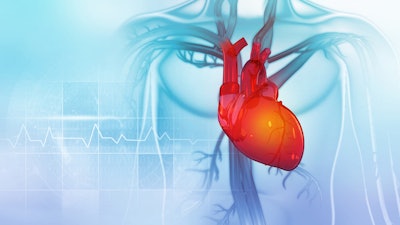
At 41, David Pinto saw a doctor for the first time in a dozen years. Before then, the high school health and PE teacher and coach from Paterson, New Jersey, hadn't felt like he needed to.
After all, he was a lifelong athlete who lifted weights and rarely felt sick. When he did, he took cold medicine or maybe a day off work, and mostly just "dealt with it."
But this time, a winter cold had settled in Pinto's chest, leaving him with a "horrendous" cough and trouble breathing. Even getting out of bed felt like too much. So finally, at his wife's urging, Pinto visited an internist.
The doctor listened to his chest and ordered an X-ray, which confirmed pneumonia. But what the doctor said next – "Have you ever had any issues with your heart?" – really made Pinto's breath catch.
In addition to the lung infection, the doctor told Pinto he had a heart murmur that needed checking as soon as possible.
After his lungs cleared, Pinto saw a cardiologist. An ultrasound and CT scan revealed a congenital heart defect known as a bicuspid aortic valve. Rather than the usual three flaps opening and closing across the valve of the main artery, Pinto's heart had only two; this restricted blood flow to the body and created the murmur.
Worse yet, it had caused an aortic aneurysm, a weak spot where the wall of his heart's main artery bulged. A rupture would be life-threatening.
Pinto was stunned. During all his preseason athletic physicals as a child and teenager, no one had ever mentioned a heart problem.
"I was completely thrown off," he said.
The heart surgeon said Pinto's aneurysm was about 3 centimeters in diameter. He recommended monitoring it and waiting for it to grow larger before having surgery to repair it.
So, from early 2018 to spring 2020, Pinto underwent MRIs every few months. In the meantime, his cardiologist warned him not to lift anything heavy, overexert himself or hold his breath.
Pinto felt like he had a potential bomb ticking in his chest. A lingering thought: "At any moment this thing could pop, and I could be dead."
"Every day you're just like, is it getting any bigger? Is it staying the same size? What happens if I lift something heavy? What happens if I hold my breath?" Pinto said. "It was two years of thinking about what-ifs."
Finally, in the summer of 2020, the aneurysm was large enough for surgery.
But by then, deep into the COVID-19 pandemic, few people wanted to be anywhere near a hospital, let alone have open-heart surgery.
And COVID had just hit Pinto's family hard. Three months before his surgery, his father, a longtime volunteer firefighter also named David Pinto, died of complications from the virus in the same hospital.
Still, he did what had to be done.
The surgeon replaced Pinto's malformed heart valve and repaired the area that had the aneurysm.
Leaving the hospital, Pinto mourned his father and worried he might bring COVID home to his wife, Yvette, their then-4-year-old son, David, and his in-laws. So, he decided to recover in the home of someone who shared his deep grief: his newly widowed mother, Barbara Pinto.
For two weeks, his mother, who lives in a nearby town, cooked for him, took him to medical appointments and accompanied him on slow walks. Meanwhile, Pinto returned to teaching virtually from an upstairs bedroom.
Barbara welcomed having her "baby" home so soon after losing her husband, whom she'd begun dating at 14.
"It was good to get up in the morning and have a purpose," she said. "At that point, I needed somebody here."
Now, four years later, Pinto said he feels well. He sees his cardiologist every six months, takes cholesterol- and blood pressure-lowering medication, and remains careful not to lift anything heavy.
He's still grateful he saw a doctor for the pneumonia. If he hadn't, the aneurysm might not have been detected in time. It's why he urges other men to at least get annual physicals – for their families, if not for themselves.
"If it wasn't for the pneumonia, this could be a different story right now," Pinto said. "My son could potentially be without a father. ... I got really, really lucky."
Stories From the Heart chronicles the inspiring journeys of heart disease and stroke survivors, caregivers and advocates.






















